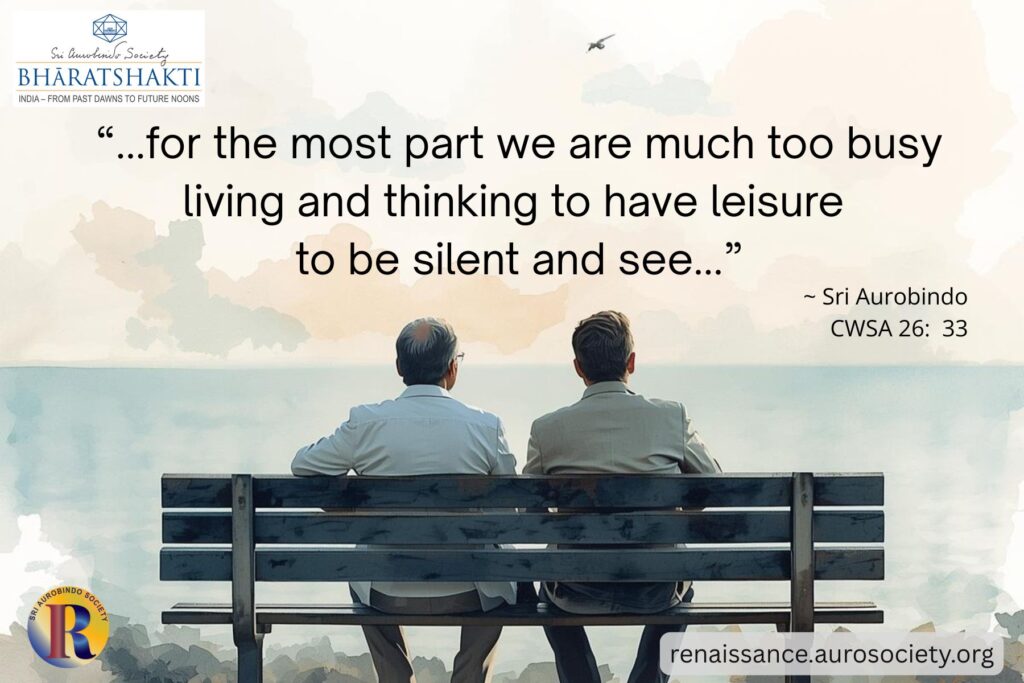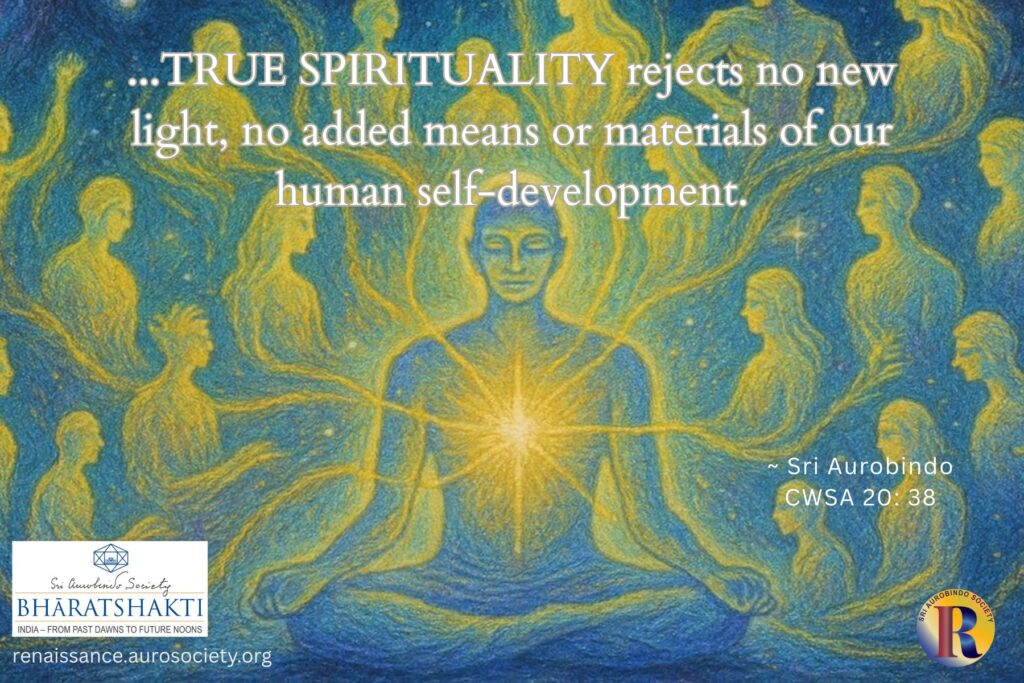Volume VI, Issue 9
Author: The Mother
Editor’s Note: Why is the world the way it is? When or how will things get better? Everyone says that Truth will one day win, but I don’t see that happening anywhere when I look around? Why is Divine not concerned about justice? Some version of such questions have come to each one of us, at some point or another. The following conversation of the Mother dated 8 January 1951 brings to light some critical points upon which we must deeply contemplate.
Here we have an answer to why we must keep and motivate younger generations to cultivate an abiding faith in “the certitude of Truth’s final victory” despite all the outer circumstances. The Mother’s profound explanation of the nature of equilibrium on which the world is founded, and how this concept may be simply explained to a young child are a great resource for teachers, parents, and all those engaged in working with youngsters.
We present the conversation in 2 parts. For the ease of online reading, we have made a few minor formatting changes without altering the text in any way.
PART 1

You say that one should have “the certitude of Truth’s final victory”. But doesn’t this certitude seem very different from, and often the very opposite of, what one teaches in ordinary life?
Yes. Generally it is believed that things always end badly in Nature. Everyone knows the story of those who have met a lamentable end after having enjoyed great success in their life; of those who had extraordinary capacities and who finally lost them; of a nation which for a long period was the model of a marvellous civilisation—the civilisation vanishes and the nation is changed into something so deplorable that one can no longer recollect what it was. It seems that the story of the earth is a story of victories followed by defeats and not of defeats followed by victories.
But in fact, whenever it is a question of universal and divine things, what is needed is the universal vision and divine understanding of things in order to know how the truth expresses itself. There is a kind of general pessimism which says that even if things begin well they end badly, that it is weakness, hypocrisy, falsehood and wickedness which always seem to have the upper hand.
That is why those who see the world in their own personal dimension have said that the world is bad and that we have only to finish with it and get out of it as soon as possible. Teachers have taught this but their teaching only proves that their vision is too narrow and in the dimension of their human individuality.
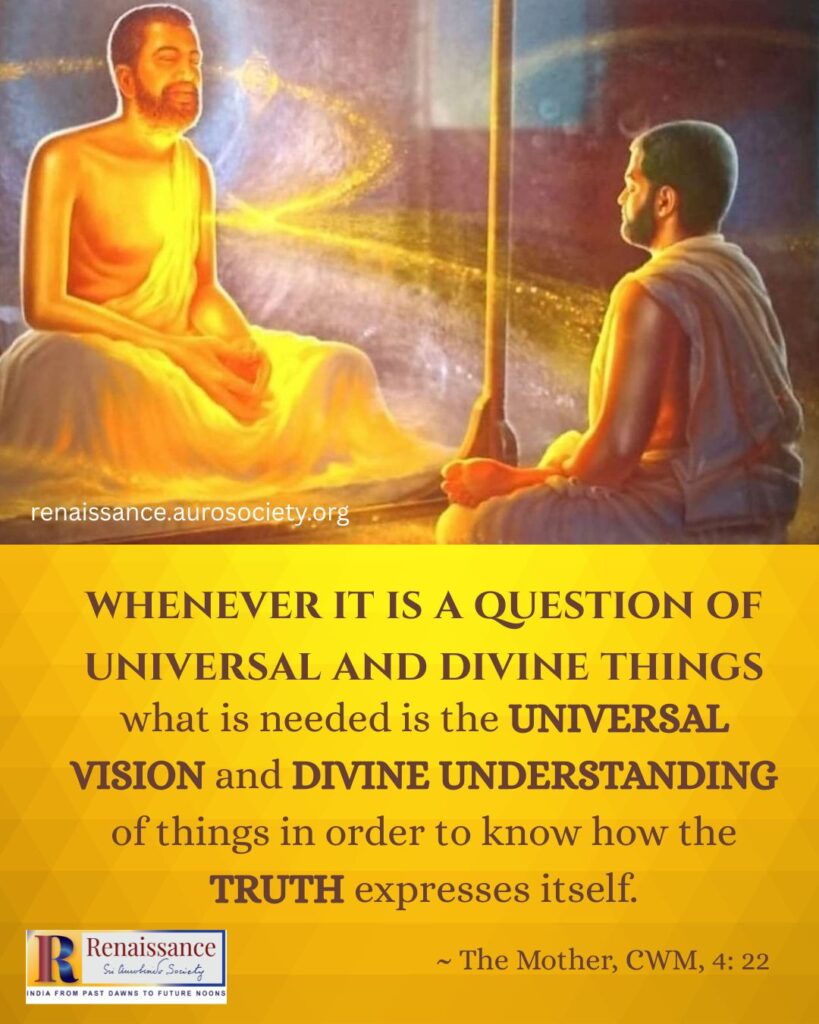
In truth, the movements of Nature are like those of the tides: they advance, they recede, advance and recede; in the universal life and even in terrestrial life, this means a progressive advance, though apparently it is cut up by withdrawals. But these withdrawals are only an appearance, as when one draws back to spring forward. You seem to be drawing back but it is simply in order to go much farther.
You will tell me that all this is very well, but how to give a child the certitude that the truth will triumph? For, when he learns history, when he observes Nature, he will see that things don’t always end well.
Children must be taught to see the divine manifestation in the world and not the side which ends badly.
No, if the child thinks that the Divine is different from the world, his idea that everything ends badly will be quite justified.
Children must be given the idea of divine justice.
But we know nothing about it, for this justice does not manifest in the world as it is today.
However, if one observes things a little deeply, one perceives that there is progress, that things become better and better, though apparently they do not improve. And for a consciousness seated a little higher, it is quite evident that all evil—at least what we call evil—all falsehood, all that is contrary to the Truth, all suffering, all opposition is the result of a disequilibrium. I believe that one who is habituated to seeing things from this higher plane sees immediately that it is like that.
Consequently, the world cannot be founded upon a disequilibrium, for if so it would have long since disappeared. One feels that at the origin of the universe there must have been a supreme Equilibrium and, perhaps, as we said the other day, a progressive equilibrium, an equilibrium which is the exact opposite of all that we have been taught and all that we are accustomed to call “evil”. There is no absolute evil, but an evil, a more or less partial disequilibrium.
This may be taught to a child in a very simple way; it may be shown with the help of material things that an object will fall if it is not balanced, that only things in equilibrium can keep their position and duration.
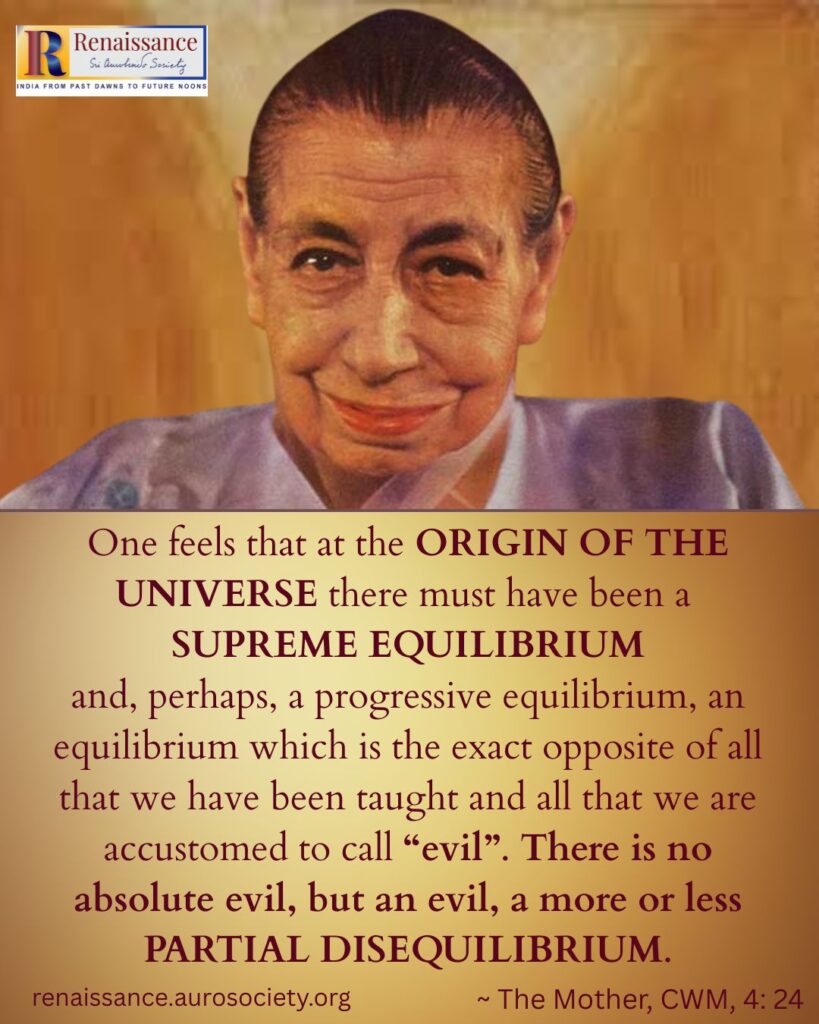
There is another quality which must be cultivated in a child from a very young age: that is the feeling of uneasiness, of a moral disbalance which it feels when it has done certain things, not because it has been told not to do them, not because it fears punishment, but spontaneously. For example, a child who hurts its comrade through mischief, if it is in its normal, natural state, will experience uneasiness, a grief deep in its being, because what it has done is contrary to its inner truth.
For in spite of all teachings, in spite of all that thought can think, there is something in the depths which has a feeling of a perfection, a greatness, a truth, and is painfully contradicted by all the movements opposing this truth. If a child has not been spoilt by its milieu, by deplorable examples around it, that is, if it is in the normal state, spontaneously, without its being told anything, it will feel an uneasiness when it has done something against the truth of its being. And it is exactly upon this that later its effort for progress must be founded.
For, if you want to find one teaching, one doctrine upon which to base your progress, you will never find anything—or, to be more exact, you will find something else, for in accordance with the climate, the age, the civilisation, the teaching given is quite conflicting. When one person says, “This is good”, another will say, “No, this is bad”, and with the same logic, the same persuasive force. Consequently, it is not upon this that one can build.
Religion has always tried to establish a dogma, and it will tell you that if you conform to the dogma you are in the truth and if you don’t you are in the falsehood. But all this has never led to anything and has only created confusion.
There is only one true guide, that is the inner guide, who does not pass through the mental consciousness.
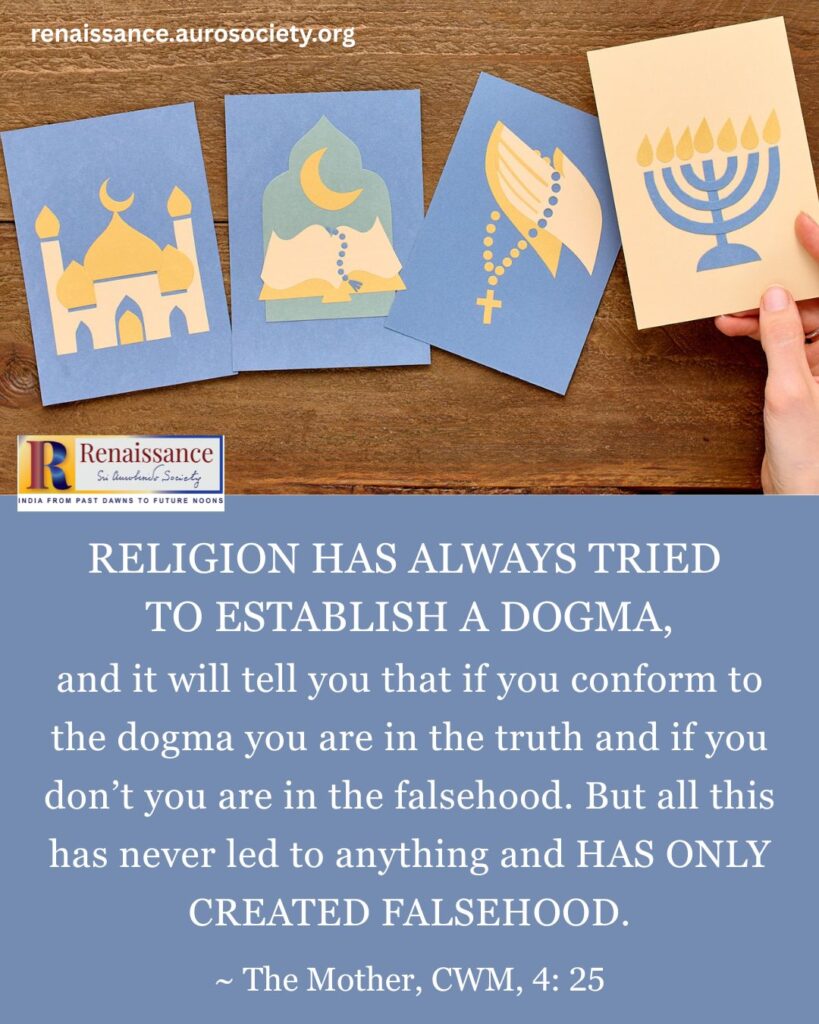
Naturally, if a child gets a disastrous education, it will try ever harder to extinguish within itself this little true thing, and sometimes it succeeds so well that it loses all contact with it, and also the power of distinguishing between good and evil.
That is why I insist upon this, and I say that from their infancy children must be taught that there is an inner reality—within themselves, within the earth, within the universe—and that they, the earth and the universe exist only as a function of this truth, and that if it did not exist the child would not last, even the short time that it does, and that everything would dissolve even as it comes into being.
And because this is the real basis of the universe, naturally it is this which will triumph; and all that opposes this cannot endure as long as this does, because it is That, the eternal thing which is at the base of the universe.
It is not a question, of course, of giving a child philosophical explanations, but he could very well be given the feeling of this kind of inner comfort, of satisfaction, and sometimes, of an intense joy when he obeys this little very silent thing within him which will prevent him from doing what is contrary to it. It is on an experience of this kind that teaching may be based. The child must be given the impression that nothing can endure if he does not have within himself this true satisfaction which alone is permanent.
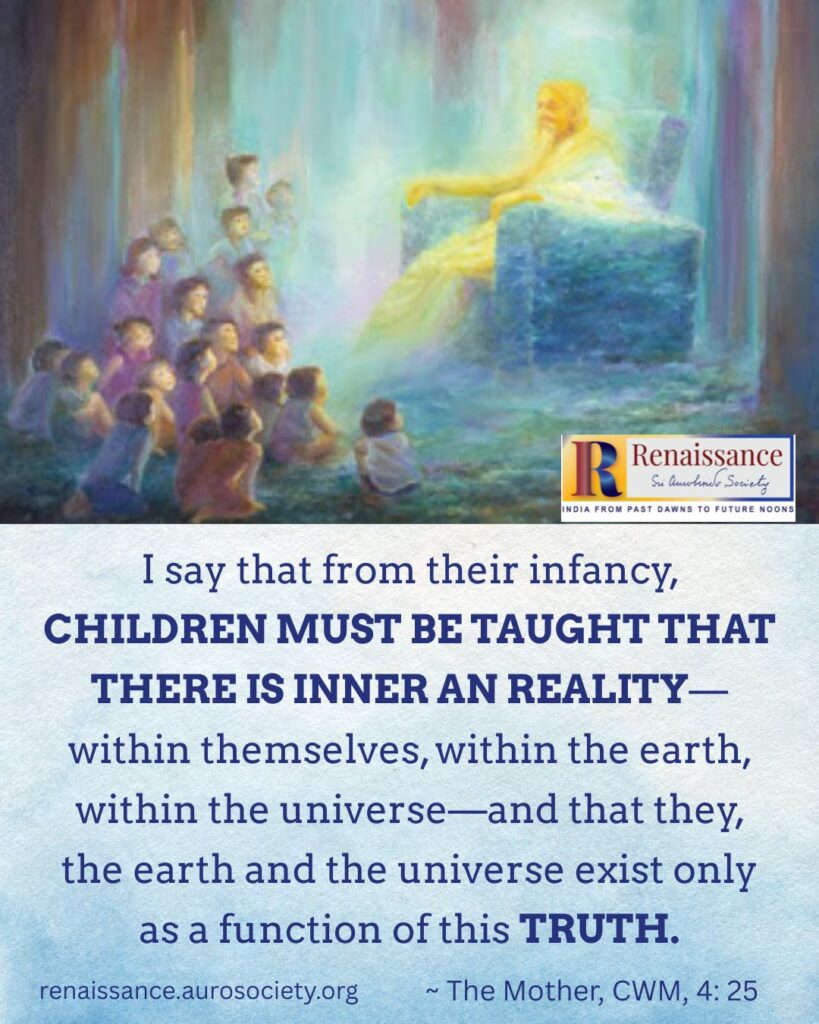
Continued in PART 2
~ The Mother, CWM, 4: 22-28
~ Graphic design: Akshay Sonakiya & Beloo Mehra


